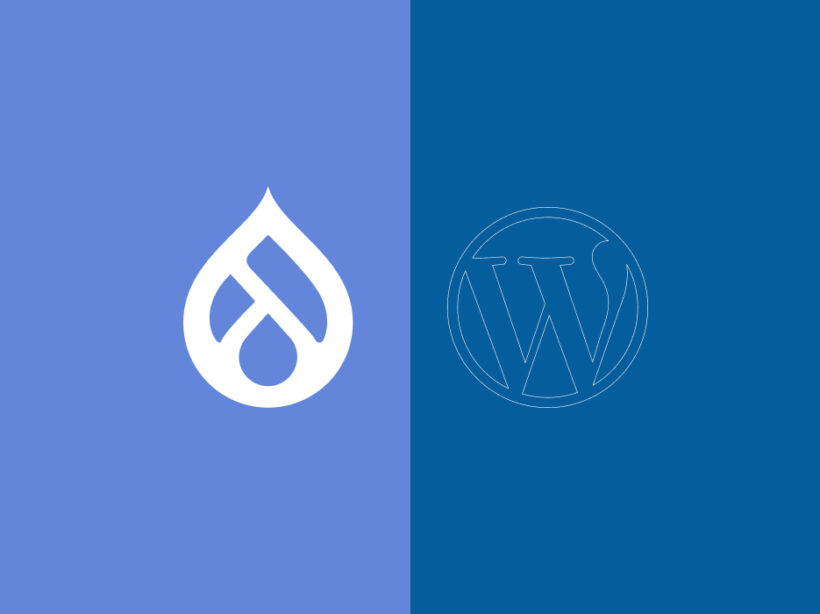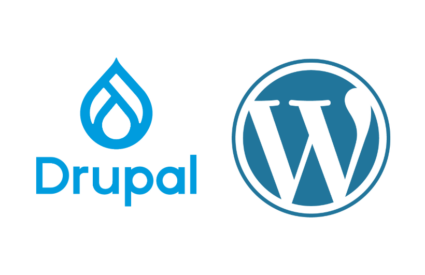If you’re researching content management systems (CMS), you’ve probably come across Drupal and WordPress. These CMS platforms are two of the most popular systems that help organizations and individuals build and manage websites easily. But how do you know which platform is right for you?
In this guide, we’ll take a deep dive into the basics of each platform to help simplify your choice. Here’s what we’ll cover:
- What are WordPress and Drupal?
- Drupal vs. WordPress: Side-by-Side Comparison
- Which is better: WordPress or Drupal?
Ultimately, finding the right CMS depends on your unique needs, web design experience, and budget. This guide cuts through the noise to deliver need-to-know information for these top platforms.
What are WordPress and Drupal?
Drupal and WordPress are both CMS solutions, which allow users to create and maintain robust websites. These platforms separate a website’s front-end content management from the back-end development process, allowing individuals with no coding experience to add new website content and make updates easily.
Drupal and WordPress are often compared to each other since they are both “open-source,” meaning they’re freely available for anyone to download and can be expanded with additional or modified code. Because of their scalability and flexibility, Drupal and WordPress are both viable options for organizations of any size.
Here are some usage statistics showing how often these platforms are used in comparison to other systems:
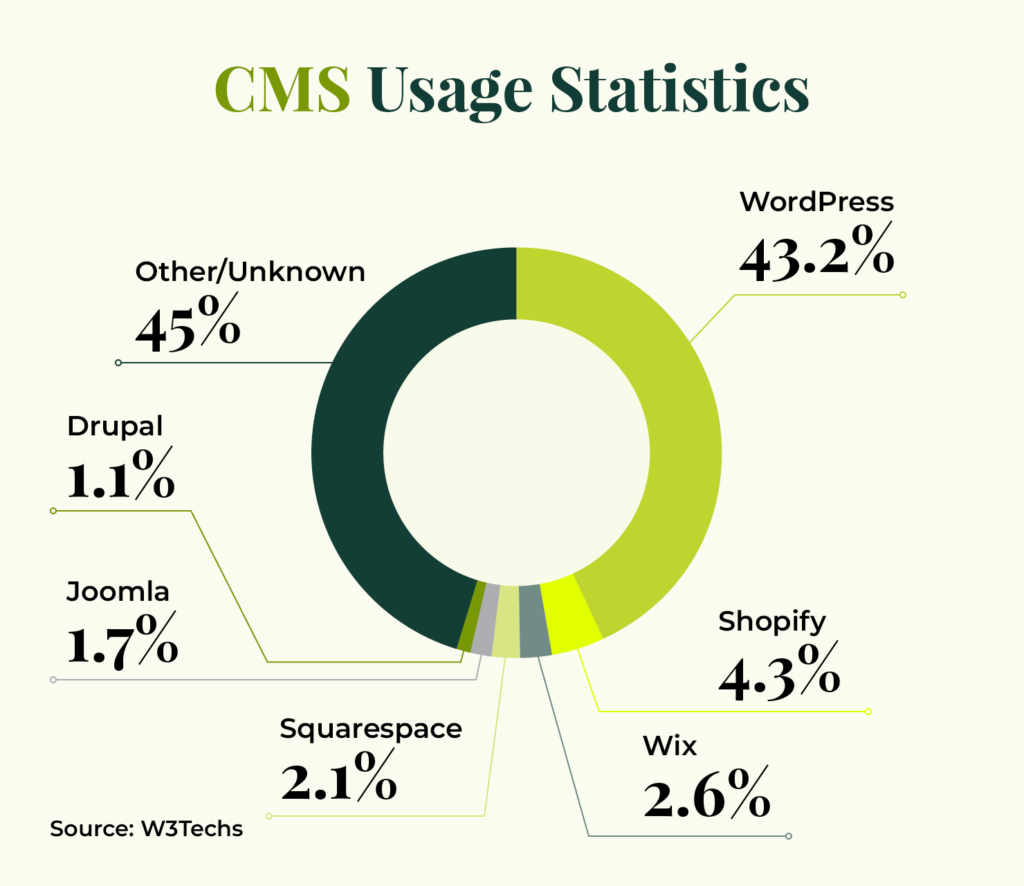
WordPress Overview
Currently, WordPress is the world’s most popular CMS. Originally launched in 2003 as a simple blogging platform, WordPress now supports 43.2% of all websites. It’s a free and open-source CMS that many organizations use, like nonprofits and businesses. You can fully customize your WordPress website easily and quickly, with a variety of plugins and themes.
Here are some of the benefits of using WordPress:
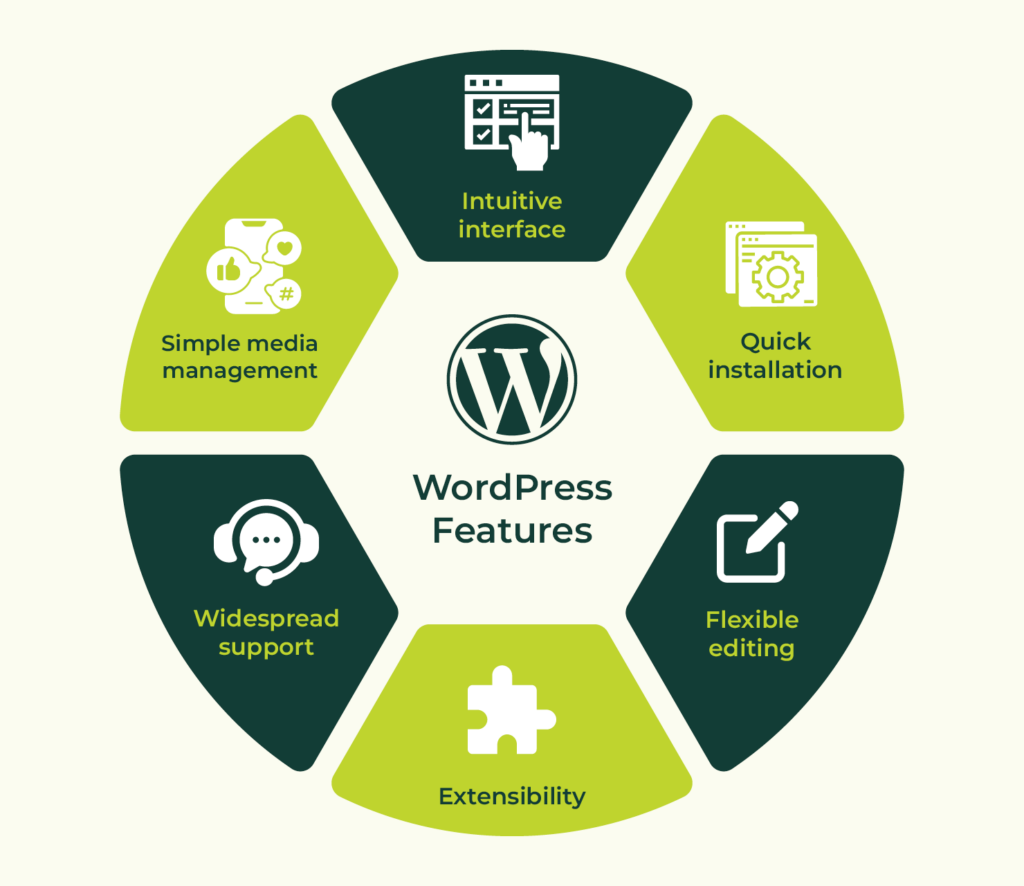
- Intuitive and easy to use. WordPress is very user-friendly, especially for non-developers. It features an intuitive user interface and simple media management processes.
- Quick installation. It’s possible to develop WordPress sites very quickly to test out new ideas, features, and approaches.
- Flexible editing experience. The built-in Gutenberg editor and plugins that add additional types of Gutenberg blocks make it simple to visually create a wide variety of layouts for your content.
- Robust extensions. WordPress’ third-party theme and plugin communities make it similarly easy to extend WordPress capabilities without custom development.
- Support. WordPress has a massive global community thanks to its open-source network, empowering you to find support for any issue.
- SEO optimizations. WordPress offers out-of-the-box SEO features such as optimized URL structures and simple methods to verify your site with search engines. You may also download SEO plugins like Yoast that offer SEO recommendations and redirect management.
- Media management. The built-in media manager for WordPress is robust, intuitive, and extensible.
- Integrations. If you use specialized systems to manage your email lists and customer relationships, chances are that these integrations already exist and are maintained by the tools themselves for WordPress.
Watch Kanopi’s webinar for more details about how to manage content in WordPress:
Drupal Overview
Currently, Drupal powers 1.1% of all websites and 3% of the top 10,000 websites. Although it’s much less commonly used, Drupal is still a viable option for a wide variety of websites, including sites for government agencies, universities, and nonprofits.
The latest version, Drupal 10, was launched in December 2022. It is an expandable framework that has both out-of-the-box functionality and the ability to expand upon that platform with advanced features and community-contributed code.
Here are some of the benefits of using Drupal:
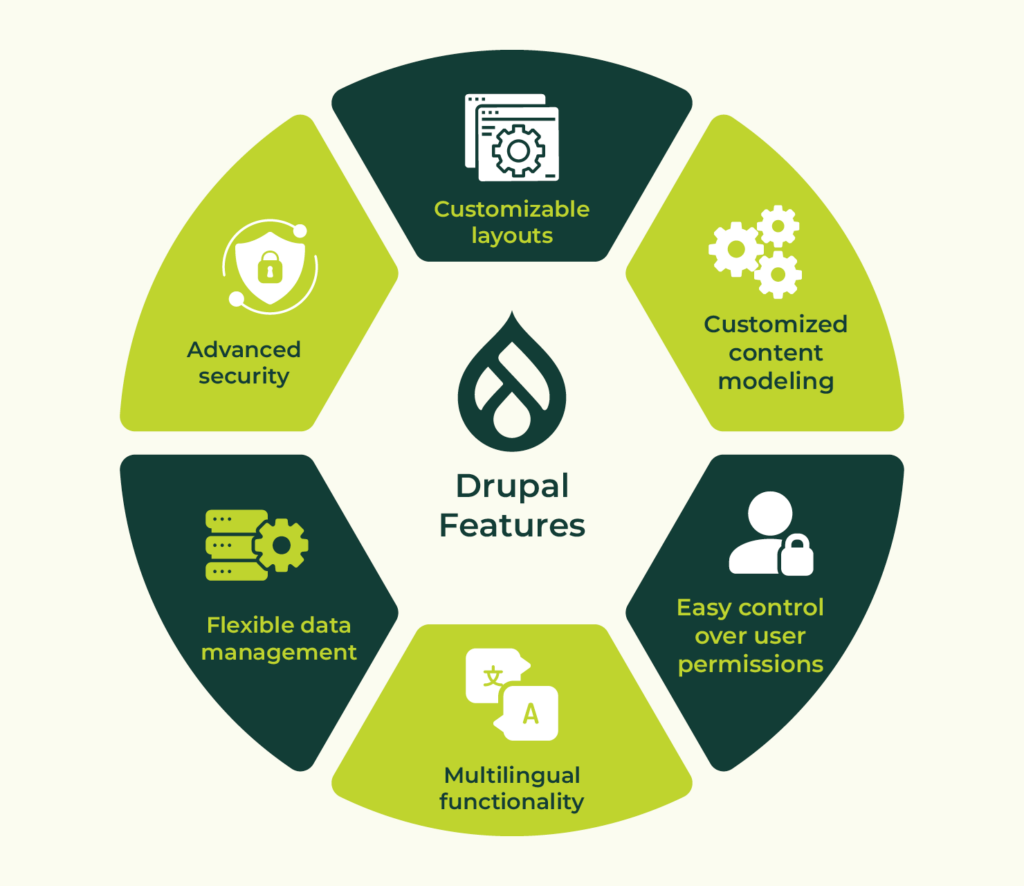
- Customized content modeling. Drupal offers the ability to customize content types, fields, and content presentation to meet any content strategy.
- Easy control over user permissions. Drupal has a built-in access control system where you can create new visitor and administrator groups with granular permissions for anywhere from a few users to hundreds of thousands.
- Multilingual functionality. Starting with Drupal 8, different versions of the same content can be presented in multiple languages out of the box.
- Data management. Drupal’s taxonomy system is flexible and ideal for handling lots of content metadata.
- Security. Drupal has a dedicated security team that evaluates widely used modules for any vulnerabilities.
- Accessibility. Drupal is committed to aligning its back-end editing experience with WCAG 2.0 guidelines as much as possible, making it a great choice for users who need assistive technologies when creating content and maintaining sites.
- Inline editing. For simple layouts, Drupal provides the ability to edit content while “looking at” your site. Keep in mind that as content gets more customized and complex, this is more difficult to use.
- Customizable layouts. The built-in Drupal system for managing “blocks” of content for sidebars, footers, and other areas allows for detailed control over which pages and contexts in which the content appears. Additionally, it makes it easier to show the same, editable piece of content site-wide.
- SEO optimizations. Free community modules extend Drupal’s core offering with human-readable URLs, XML sitemaps, advanced meta tags, and schema.org vocabularies.
- Media management. Drupal ships with a robust Media Library for managing images, videos, documents, and audio files.
- Integrations. Drupal integrates with a wide range of third-party applications including Google Analytics, Salesforce, and several social media sites.
Let’s compare the features of these platforms side by side for a clearer understanding of their benefits and potential drawbacks.
Drupal vs. WordPress: Side-by-Side Comparison
| Drupal | WordPress | |
| Ease of use | Steeper learning curve for beginners or non-developers | Simple user interface that beginners can easily grasp |
| Security | Enterprise-level security and in-depth security reporting | More vulnerabilities due to the plugin ecosystem |
| Costs | Drupal developers can be more expensive to partner with | WordPress developers are typically more cost-effective |
| Deployment | More complicated installation process | More straightforward installation process |
| Performance | Built to load content-heavy sites quickly; offers caching out of the box | Overuse of plugins can slow load speeds; offers plugins to manage caching |
| Customization | 51,000+ modules and 3,000+ themes | 59,000+ plugins and 11,000+ themes |
| Support | Resources include forums, community documentation, training, professional services, and more | Resources include a community forum, tutorials, guides, and professional services |
| SEO Capabilities | Modules like Pathauto available to manage SEO | Plugins like Yoast available to manage SEO |
| Noteworthy websites | The State of Rhode Island Eye Recommend Penn State ACLU UNDP | Meta Salesforce Time Physicians for Human Rights Disney |
Ease of use
In general, WordPress provides an easier admin user experience, although Drupal is coming close with its recent version releases. The WordPress interface is simple for even the most casual of users to grasp—there’s no need for a third party to step in. WordPress also has more ready-made themes available from sites like ThemeForest, which helps with cost and timeline barriers. For example, Avada is the #1 best-selling WordPress theme.
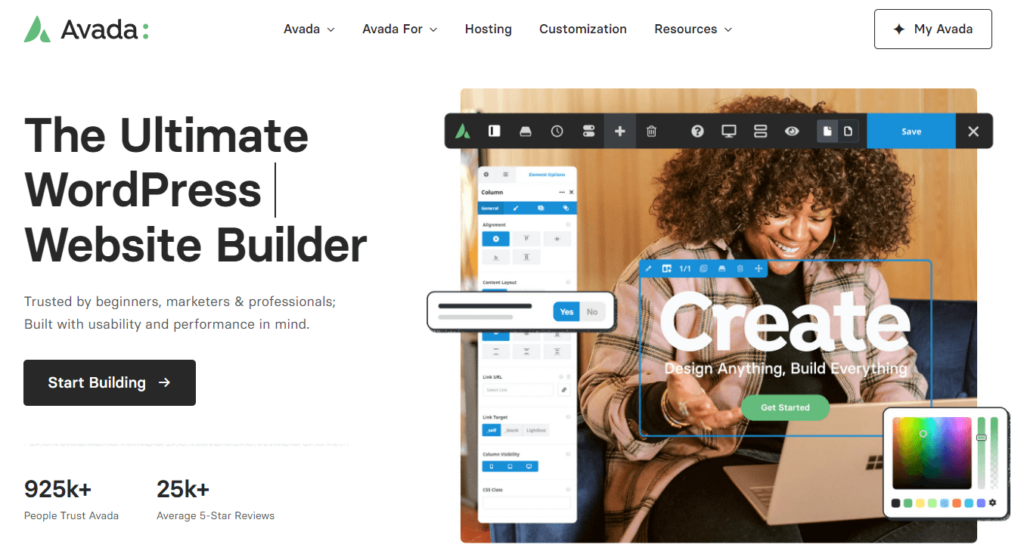
If you decide to use WordPress, it’ll likely take less time to find a great theme and set up a fully functioning site than with Drupal. Drupal themes do exist, but many Drupal websites use custom-coded themes or at least one that’s highly customized. This is why many Drupal users end up reaching out to developers to make their sites visually appealing and functional. Drupal has become the clear leader as an enterprise-level CMS platform for more complex projects.
While Drupal may require more technical experience and help than WordPress does, this can show in the end product. Drupal is a great option for companies that have more robust, design-heavy requirements, or a lot of customization.
Security
Whether your website hosts important organizational data or processes your constituents’ financial information, you need ample security and protective steps to ward off data breaches or hackers.
Both core systems have some sort of security measures in place. However, WordPress’ massive third-party plugin ecosystem introduces some risks that aren’t as prevalent in Drupal and its modules. Plugin vulnerabilities account for 55.9% of all known entry points of malicious actors.
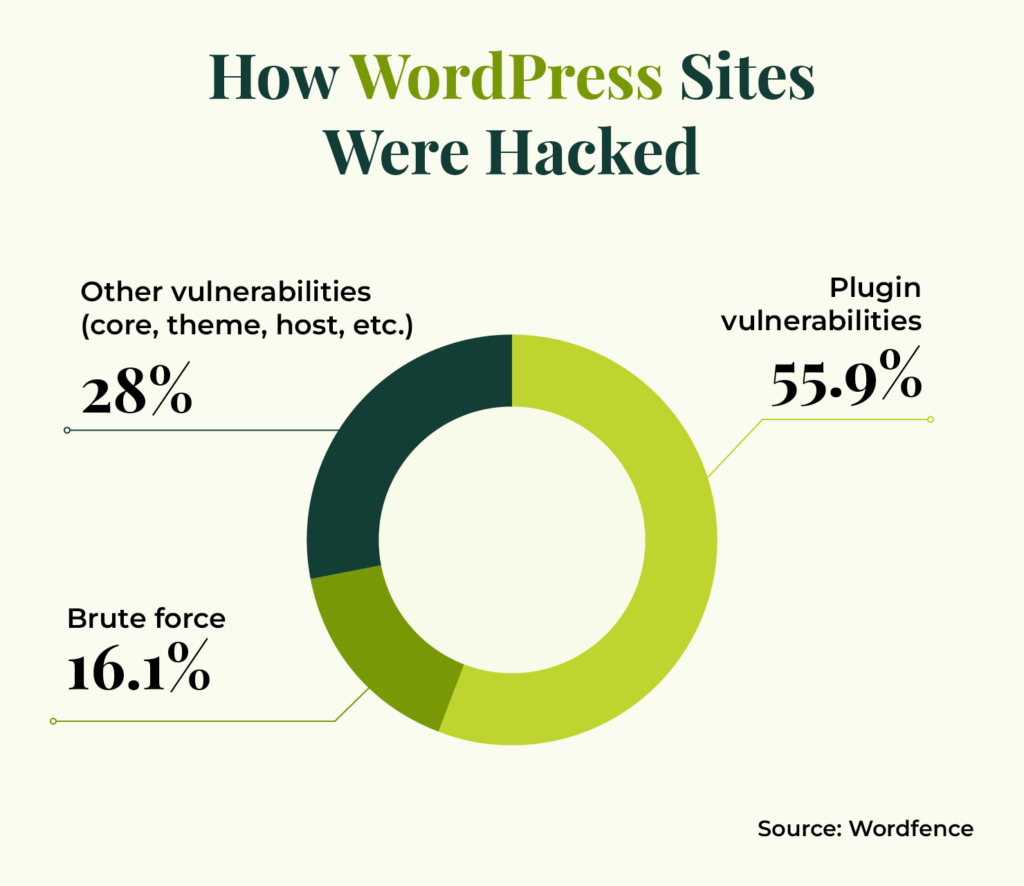
On the other hand, one of Drupal’s top features is its enterprise-level security and ability to provide in-depth security reports. This is a driving factor for why Drupal is often used by government institutions and other large, security-conscious organizations.
Costs
As open-source platforms, Drupal and WordPress are free to use. However, platform costs aren’t the only expenses to consider. If you need development or design support, you’ll have to consider the costs of partnering with a platform expert.
In general, there are fewer Drupal developers than WordPress experts, and Drupal experts tend to offer more specialized services. That could make the cost of working with a Drupal partner more expensive.
Another cost to consider is the price of the platform you choose to host your site. Complex Drupal sites may require more costly hosts, while many WordPress hosts are available for just a few dollars a month.
Costs that are common across both platforms include staff training expenses, maintenance and security support, and additional expenses for plugins or modules.
Deployment
Speed to market is another factor to consider when developing a new website. How quickly do you need to get your site up and running? In general, it tends to be faster and easier to develop a WordPress site and push it live, whereas Drupal’s development process may be more involved.
The migration tools you use or the software experts you partner with also play a major role in the timing of the installation process. Carefully vet your support resources to get more information about the timeline you can expect for getting your site live.
Performance
WordPress and Drupal each offer features to improve your site speed and ensure high performance. For example, Drupal offers built-in site caching tools, while WordPress has a variety of plugins that can help manage caching.
However, WordPress’s vast plugin and theme library present some performance risks. Using too many plugins or poorly designed plugins or themes can slow your site down.
On the other hand, Drupal is built to handle the performance needs of complex websites with robust data needs. Drupal’s built-in optimization features and enterprise-level capabilities support faster load speeds for large websites.
Customization
Thanks to their open-source code, both Drupal and WordPress have ample opportunities for you to expand and customize your CMS to your organization’s needs:
- Drupal has 51,000+ modules that you can add to your core platform and 3,000+ themes.
- WordPress has 59,000+ plugins to expand your core system and 11,000+ themes.
While WordPress is famous for its clean, consistent administrative interface, Drupal allows you to apply different administrative themes to your website or even use your public-facing theme as part of your site management and editing experience.
Support
If you’re looking for support or advice to manage your website, you’ll find plenty of resources available for both Drupal and WordPress. Since WordPress is much more commonly used, there are plenty of developers and resources available if you need help, such as online tutorials and guides. Drupal also offers forums, robust community documentation, and training support.
SEO Capabilities
Both WordPress and Drupal offer SEO features and extensions that can be integrated into the platforms to help with good search engine ranking. For example, Drupal’s PathAuto module is a great place to start—this module automatically creates user-friendly URLs for your content. In addition, WordPress’s Yoast plugin offers technical SEO suggestions, advanced XML sitemaps, and readability analysis.
Which is better: WordPress or Drupal?
Realistically, there is no best overall CMS, but it is worth it to explore the differences to consider which solution is right for your unique situation and needs.
Taking in the facts above, WordPress is a great solution with its wide range of plugins and extendability options. It’s easy to use, can be set up quickly, and offers a robust community of developers if you ever have questions or concerns.
However, if you are building a more complex site that will facilitate lots of important data or sensitive information, Drupal is a better choice for its high-security features. You can still expand and customize your system, but it might take a little longer.
Partnering with WordPress and Drupal Experts
Regardless of which option you choose, consider partnering with a dedicated website service agency, like Kanopi. Kanopi knows that all organizations and websites are different—they come with their own needs and have different goals. We can aid your journey by learning about your mission and developing the best website for your organization.
On top of helping you figure out the best CMS for your needs, the Kanopi team can:
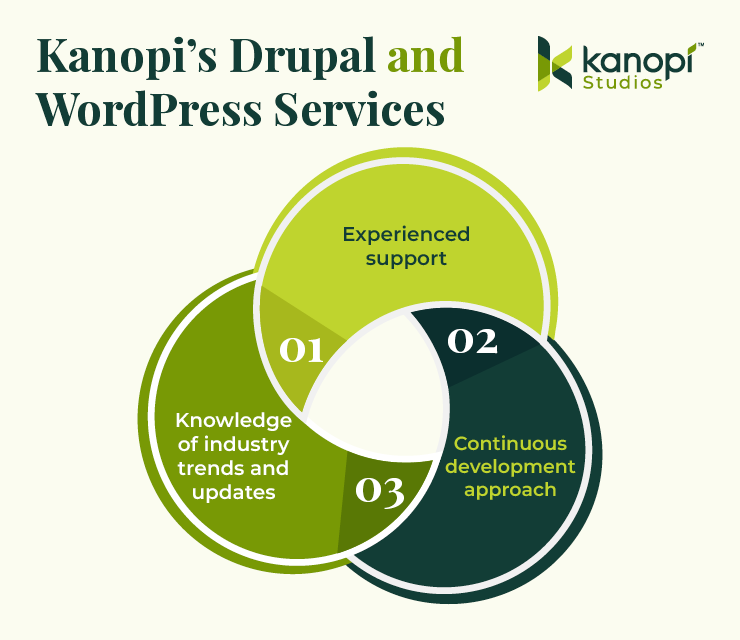
- Offer experienced support. Working with an experienced developer is essential to give your site the foundation it needs to succeed. Kanopi’s team offers a wealth of experience in both Drupal and WordPress. Each of our Drupal team members has an average of 11 years of Drupal development experience and our WordPress developers regularly speak at WordCamp conferences throughout North America.
- Promote a continuous improvement approach. Through this approach, we’ll ensure that your website is always up to date, working properly, and set up for long-term growth. This includes module/plugin upgrades, bug fixes, security patches, third-party integrations, and more.
- Stay updated on industry trends, standards, and updates. Regardless of whether you choose WordPress or Drupal, our developers stay up to date with CMS trends by attending conferences and making regular contributions to both communities to help extend and maintain the systems.
For examples of our work, explore our past Drupal and WordPress projects. We work with clients across multiple industries, including healthcare organizations, universities, government organizations, businesses, and nonprofits. We can manage your Drupal or WordPress project at any stage, from migrations to full builds and support.
Our client testimonials speak for themselves—clients emphasize factors like our “honest and transparent” customer service, flexibility, inclusiveness, and “uncanny ability to understand [client] needs.”
Interested in partnering with Kanopi? It doesn’t matter what CMS you use—we would love to hear from you and get started with a customized plan to make your website the best it can be.
Additional Resources
Continue learning about Drupal and WordPress with the help of these additional resources:
- 4 Simple Steps to Migrate from Drupal to WordPress. Interested in migrating from Drupal to WordPress after learning about the platform? Start with this guide to streamline the process.
- Using WordPress for Nonprofits: The Ultimate Guide. Interested in using WordPress for your nonprofit website? This guide has everything charitable organizations need to know about the platform.
- The Ultimate Guide to Drupal Planning and Development. Want to take a closer look at the Drupal planning and development process? Kanopi’s ultimate guide is a great place to start.


